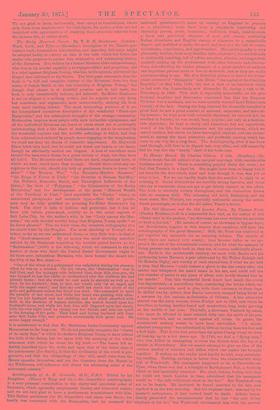The Body Mountain Saints. By T. B. H. Stenhouse. (London
Ward, Lock, and Tyler.)—Macaulay's description of Dr. Naros's por tentous book, tremendous introduction, and imposing title-page migh be adopted bodily to convey an idea of the task which lies before the reader who proposes to peruse this exhaustive and exhausting history of the Mormons. It is written by a former Mormon elder and missionary, who was in his secular capacity a newspaper-editor and proprietor, and is a rebel against Brigham Young, who has, in his opinion, perverted the Gospel once delivered to the Saints. The title-page announces that the book is "a full and complete history of the Mormons, from the first vision of Joseph Smith to the last courtship of Brigham Young," but though that phrase is of doubtful promise and in bad taste, the book is only unendurably tedious, not indecent. Ex-Elder Stenhouse is not an elegant or a striking writer, and he repeats not only facts, but assertions and arguments most unnecessarily, making his book very hard reading indeed. The most interesting portions of it are the interpolated narratives descriptive of the wonderful "Hand-cart Emigration," and the subsequent struggles of the strange community. Mormonism inspires most people with such invincible repugnance, and all the individual Mormons one hears or reads about are so profoundly uninteresting, that a fair share of enthusiasm is not to be aroused by the wonderful exploits and the terrible sufferings to which, had they been achieved and endured by people more engaging to the imagination, we could not deny the charm of romantic importance. Mr. Hepworth Dixon tried very hard, but he could not touch our hearts or our fancy, though he effectually excited our disgust. A host of travellers have treated the unsavoury theme in a great variety of ways, but they have all failed. The Mormons and their State are hard, unpleasant facts, of which we have heard more than enough. Should there exist any ex- ceptions to this rule, should any lady or gentleman desire to learn "all about " " the Mormon War," the Mountain-Meadow Massacre,'' 4' the Reign of Terror in Utah," " the Doctrine of Human Sacrifice,', the Political, Domestic, Social, and Theological Influences of the Saints," the facts of " Polygamy," the Colonisation of the Rocky Mountains," and the development of the great "Mineral Wealth of the Territory of Utah " (and especially the "Emma " mine), in sensational paragraphs and eccentric type,—that lady or gentle- man may be fully gratified on perusing Ex-Elder Stenhcuse's big book. The story it tells is hideous and grotesque, but it has all been told before, piece-meal, notably as to the social aspects of Salt Lake City, by the author's wife, in her "Lady among the Mor- mons;" the only decided novelty being that Brigham Young spells " as he damn pleases." This we learn from the eccentric orthography of a fac-simile letter by the Prophet. The most shocking of Young's doc- trines, so far as we can understand them—a very little way—is that of the "blood-atonement" By no moans the most shocking anecdote related by Mr. Stenhonse respecting the terrible period known as the 4' Reformation" (1856) is the following, which we commend to the at- tention of those who think the United States' Government ought to let those poor, industrious Mormons, who have turned the desert into the City of the Bee, alone :— "One of the wives of a polygamist was unfaithful during his absence, when he was on a mission. On his return, tho Reformation' was in full blast, and the unhappy wife believed that, from this fauxpas, she was doomed to lose her claim to motherhood over the children she had already borne ; that she would be cast aside in eternity as well as in time, by her husband ; that, in fact, she would only ' be an angel, and with the angels stand ;' and that she could not reach the circle of the gods and goddesses unless her blood was shed. She consented to meet the penalty of her error, and while her heart was gushing with affec- tion for her husband and her children, and her mind absorbed with faith in the doctrine of human sacrifice, she seated herself upori her husband's knee, and while his last kiss still lingered upon her cheek, with his own right hand he calmly cut her throat, and sent her spirit to the keeping of the gods. That kind and loving husband still lives near Salt Lake City, and preaches occasionally with great zeaL He scorns happy enough."
It is satisfactory to find that Mr. Stenhouse backs Christianity against Mormonism in the long-run. We do not precisely recognise the "charm of its early days," of which he declares Brigham Young to have robbed the faith of the Saints, but we agree with the meaning of the windy utterance with which he closes his big book :—" The lesson left in- delibly inscribed upon his work, and upon that of the latter days of his predecessor (Joe Smith), is that the civilisation of the world is pro- gressive, and that the whisperings of that still, small voice from the Mount opposite Jerusalem, and not the thunders from the Mount in the Wilderness, will influence and direct the advancing mind of the nineteenth century."


































 Previous page
Previous page